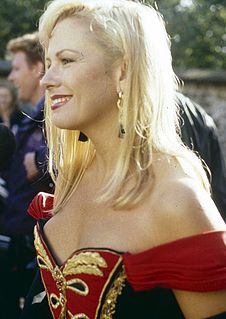A Quote by Ira Glass
In most daily journalism, you only fact-check something if it seems a little fishy.
Related Quotes
It seems like journalism over here in UK, in general, is at a higher level: not overrun by all these teeny little blogs. There's more of a historical context for it or something. It seems like people review something or take a listen to something and they really do their homework. That's just what it seems like.
I think everybody's talking about like facts and truth and you know like that 'We're here to fact check' and all of that, that's the base material of journalism. You cannot have journalism without facts and truth. But if facts and truth were what actually you know sort of moved people's lives and moved their decision-making like the election would have had a different outcome.
One of the experiences of prayer is that it seems that nothing happens. But when you start with it and look back over a long period of prayer, you suddenly realize that something has happened. What is most close, most intimate, most present, often cannot be experienced directly but only with a certain distance. When I think that I am only distracted, just wasting my time, something is happening too Immediate for knowing, understanding, and experiencing. Only in retrospect do I realize that something very important has taken place.
How this feels is I'm just another task in God's daily planner: The Renaissance pencilled in for right after the Dark Ages. The Information Age is scheduled immediately after the Industrial Revolution. Then the Post-Modern Era, then The Four Horsemen of the Apocalypse. Famine. Check. Pestilence. Check. War. Check. Death. Check. And between the big events, the earthquakes and tidal waves, God's got me squeezed in for a cameo appearance. Then maybe in thirty years, or maybe next year, God's daily planner has me finished.
Anyone who does investigative journalism is not in it for the money. Investigative journalism by nature is the most work intensive kind of journalism you can take on. That's why you see less and less investigative journalism at newspapers and magazines. No matter what you're paid for it, you put in so many man-hours it's one of the least lucrative aspects of journalism you can take on.
It is amazing how little effort most people make to improve control of their attention. If reading a book seems too difficult, instead of sharpening concentration we tend to set it aside and instead turn on the television, which not only requires minimal attention, but in fact tends to diffuse what little it commands with choppy editing, commercial interruptions, and generally inane content.
I want to set up a new standard: ‘scientific journalism.’ If you publish a paper on DNA, you are required, by all the good biological journals, to submit the data that has informed your research—the idea being that people will replicate it, check it, verify it. So this is something that needs to be done for journalism as well. There is an immediate power imbalance, in that readers are unable to verify what they are being told, and that leads to abuse.
Americans are good with to-do lists; just tell us what to do, and we'll do it. Throughout our history, we have proven that. Colonize. Check. Win our independence. Check. Form a union. Check. Expand to the Pacific. Check. Settle the West. Check. Keep the Union together. Check. Industrialize. Check. Fight the Nazis. Check.
































